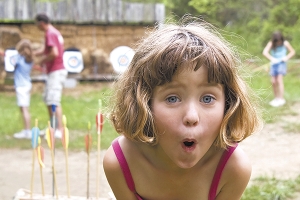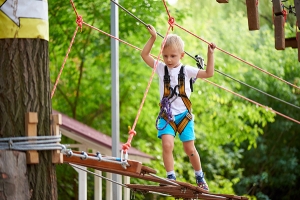
Ask kids why they love camp, and you’ll often hear, “Because it’s FUN!” For many families, camp is an experience where kids have a great time doing things they don’t usually get to do. But benefits of camp reach well beyond learning to surf or petting a dolphin.
In a five-year independent study sponsored by the American Camp Association, researchers surveyed past campers, parents and staff about the impact of camp on their lives. Overall, the findings show that kids who attend camp are more optimistic, self-confident, responsible, joyful, and learn skills to relate better to others. Survey participants who were ages 18–25 and attended camp as kids reported that what they learned at camp is helping them thrive in school and the workplace.
At a time when learning social skills isn’t as straightforward as it once was, camp helps kids develop relationship skills that have lifelong benefits.
Parents don’t have to wait for kids to attend camp to begin creating a transformational culture at home. Here’s how to use camp strategies to benefit your family year-round:
- Talk about what matters most. At camp, kids learn how to communicate what’s important to them and to listen to what’s important to others.
Talk about your family values and what your child hopes to gain from camp. What character traits are important to you? When choosing a camp, ask the questions: Philosophically, does the culture of the camp resonate with our family? Do the values taught match ours?
- Work as a team. While exploring camp options together, utilize the team mentality taught at camp. Team building grows confidence and competence as kids participate in activities with support and encouragement of teammates and camp staff. At home, think of your family as a team—a group of people linked by a common purpose who are working together to create connection and a sense of belonging.
Some camps are skills-based and individual-focused. Others offer a variety of activities that groups can try together. Even if a skills-based camp is preferred, look for camps that also support social learning and growth. Ideally, camp will help children improve skills and discover new ones while gaining confidence and learning how to be a good friend and teammate.
- Step outside the comfort zone. A hallmark of camp is the opportunity for kids to try new things and see what they like best. Find out what activities and guidelines camp staff use to encourage independence and get kids to step outside their comfort zones; then think about how to incorporate the ideas at home.
For example, how does staff instill the belief that kids are capable of more than what is asked of them? If kids are expected to make their beds every day, start the same daily habit. If kindness is rewarded, set up a similar system at home.
“By putting into practice these kid-tested camp strategies, you’re preparing children for a positive camp experience while giving kids a jump-start on what you hope camp will mean to them,” says Audrey Monke, owner and director of Gold Arrow Camp and author of “Happy Campers: 9 Summer Camp Secrets for Raising Kids Who Become Thriving Adults.”
- Take advantage of learning opportunities. Kids who attend camp have a multitude of learning opportunities. Why should they have all the fun? Camp professionals are a rich resource that parents can learn from year-round by simply following favorite camps on social media and signing up for email newsletters
Take advantage of the experience and abundant resources camp experts work hard to curate and create. Their knowledge and enthusiasm will keep you in the know about child development topics that will benefit your happy camper well past summer months.
- Stay connected. Of all the camp strategies that help kids grow into successful adults, Monke stresses that staying connected at a deeper level benefits kids most. She advises parents to resist the natural inclination to return their focus entirely back to daily schedules and homework requirements, forgotten lunches, and the myriad logistical details that make up a busy family’s life.
“We don’t talk at camp about kids’ grades,” Monke says. “We talk about their interests, hopes and dreams.”
Parents can duplicate these conversations by creating time each day to step back and reflect. Much like circle time or a nightly campfire talk, encourage one another to share what’s going well and what they would like to change. Model a willingness to go deeper by slowing down, making eye contact and listening. Make time for kids to evaluate what they’re doing, how they feel, what they hope to accomplish, and what kind of support they need.
By using camp strategies proven to build character traits and social skills kids need to thrive, parents create a culture at home that promotes the ongoing growth of happy campers with benefits that last a lifetime.
....................................
Jody Lee Cates is a local mom and award-winning writer of San Diego Family Magazine’s “Parenting with Purpose” column. She also blogs about healthy relationships at www.jodyleecates.com
Camp Benefits that Last a Lifetime
American Camp Association research results are in. The unique setting of camp teaches kids to:
- Live in the moment.
- Appreciate differences as they meet new people.
- Respect and value everyone’s uniqueness.
- Work together.
- Learn by doing.
Camp experiences:
- Encourage kids to try new things.
- Foster perseverance, self-reliance and confidence.
- Develop skills that contribute to future success in college, the workplace and life.
Learn more at www.acacamps.org/resource-library/research/camp-impact-study.
_____________














